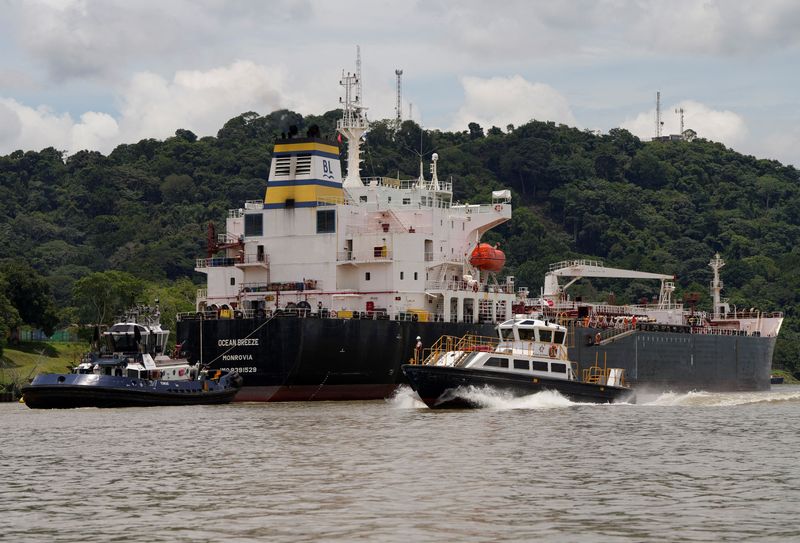By Marianna Parraga, Elida Moreno and Curtis Williams
PANAMA CITY/HOUSTON (Reuters) - The Panama Canal aims to regain vessel traffic carrying U.S. liquefied natural gas to Asia as demand in that market rises and a new reservation system allows shippers to lock in slots, following a 65% decline in the transit of its second-most important segment, the Panama Canal Authority told Reuters.
A U.S. LNG switch to Europe in the aftermath of Russia's invasion of Ukraine, combined with long waiting times and expensive fees to transit through Panama due to severe drought, have kept many LNG ships out of the canal.
Many gas exporters continue to take longer routes around South America even after the waterway's authority lifted the restrictions this year. The canal is the shortest route to Asia for U.S. gas exporters, whose sales to Japan, China, South Korea and India have grown substantially in the last decade.
"In the case of LNG, we lost 65% (of traffic), which is the traffic that now goes through Cape Horn, compared to what we had last year, two years ago," said the Canal's administrator, Ricaurte Vazquez, in an interview in Panama City.
Europe's large appetite for U.S. LNG and delays authorizing new LNG projects in the United States have been the main drivers of the switch, he added, although the canal's drought-related restrictions also played a key role, shippers said.
"The challenges of the last drought were very visible for everybody," said Anatol Feygin, an executive vice president at Cheniere Energy (NYSE:LNG), the top U.S. LNG producer.
Because the Panama Canal Authority charges a set fee per passage, it can be more convenient for U.S. producers to take longer routes to Asia depending on global LNG prices, delivery terms in contracts and seasonal demand.
"Sometimes people forget that going through the canal ... is not a free shortcut," Feygin said, referring to transit fees. "Economically, the solution of going around the Cape is not far from the economics of going through the canal."
But a recovery in Asian LNG demand, likely to continue next year, might require increased shipments through the canal.
"We do think that growth in LNG demand will be driven by Asia," Feygin added, referring to China, South Asia and Southeast Asia. "And we do think that U.S. Gulf Coast volumes will continue to be the single largest exporting node in the world."
MORE PASSAGES NEEDED
A new reservation system and lower costs allowed the canal's net income to rise 9.5% to $3.45 billion in the fiscal year that ended in September, despite the drought.
But commodities producers believe the canal's administration still has room to arrange more transits of LNG and liquefied petroleum gas (LPG) vessels. The parties have been in touch since last year to consider proposals.
Panama now offers two transit slots per day for LNG ships, but a long-term reservation system starting in January will allow producers to reserve slots up to a year in advance.
The first auction of this type, completed this month, raised $394 million and will account for 40% of all transits through its largest locks in 2025, administrator Vazquez said.
Shorter waiting times and the set-aside of a limited number of slots for vessels arriving at the canal without reservations will allow Panama to better handle arrivals. And some other measures to improve are in discussion, including some in anticipation of dry years, Vazquez added.

"It (the canal) still has some constraints that we are working through, like the fact that LNG carriers do not have night-time transit capabilities through the new locks," Feygin said.
The canal, which is monitoring the expansion of global LNG fleets and the status of new U.S. LNG projects, expects that larger LNG vessels, including floating storage units that feed LNG to onshore facilities, will be passing through Panama's largest locks in the next 18 months.